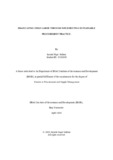| dc.contributor.advisor | Hoque, Mosta Gausul | |
| dc.contributor.author | Sultana, Sayeda Niger | |
| dc.date.accessioned | 2021-07-08T15:26:46Z | |
| dc.date.available | 2021-07-08T15:26:46Z | |
| dc.date.copyright | 2020 | |
| dc.date.issued | 2020-04 | |
| dc.identifier.other | ID 15182019 | |
| dc.identifier.uri | http://hdl.handle.net/10361/14761 | |
| dc.description | This dissertation is submitted in partial fulfillment of the requirements for the degree of Masters in Procurement and Supply Management, 2020.. | en_US |
| dc.description | Cataloged from PDF version of dissertation. | |
| dc.description | Includes bibliographical references (pages 38-39). | |
| dc.description.abstract | Though primitive form of slavery was abolished with act in 19th century, it is still there in new form of “modern slavery”. Report says 25% of the modern slavery comprises child labor practice which not only destroys children’s right to live a carefree, safe, healthy life but also destroys future prospect of having better workforce with mental and physical ability which would yield the corporate and overall country’s productivity even more. However, corporate world cannot deny the responsibility for its society. As “supply chain” is the core of an organization and “procurement” plays a vital role in overall supply chain which has great impact on the organization and its stakeholders it has greater responsibility. Moreover, “sustainable procurement practice” can implement the general guideline of child labor through introducing the “guideline in their RFQ/RFP” to be followed by the bidders. Systematic approach to selecting and awarding the qualified supplier shall not be only from economic point of view but also include social and environmental aspect as well. The study were conducted with a hypothesis of having strong correlation between procurement practice and presence of child labor in a particular supply chain which can be minimized through implementing sustainable procurement process which found to be factual through the research. The research result followed by rigorous interviews, surveys, analyzing reports and documents, reviewing journal and literature etc. Researcher, social activist, supply chain practitioner, lawyer, academician, business and social science students can get benefited through the study output and work further using this study’s outcome as secondary data. | en_US |
| dc.description.statementofresponsibility | Sayeda Niger Sultana | |
| dc.format.extent | 39 pages | |
| dc.language.iso | en | en_US |
| dc.publisher | Brac University | en_US |
| dc.rights | Brac University dissertations are protected by copyright. They may be viewed from this source for any purpose, but reproduction or distribution in any format is prohibited without written permission. | |
| dc.subject | Child labor | en_US |
| dc.subject | Sustainable procurement practice | en_US |
| dc.subject.lcsh | Child labor--Bangladesh | |
| dc.title | Eradicating child labor through implementing sustainable procurement practice | en_US |
| dc.type | Dissertation | en_US |
| dc.contributor.department | Brac Institute of Governance and Development, Brac University | |
| dc.description.degree | M. Procurement and Supply Management | |

